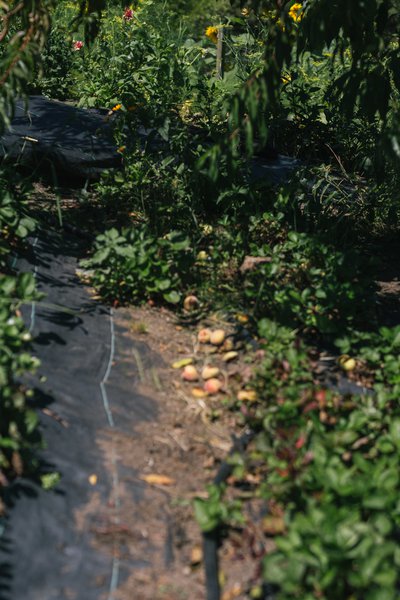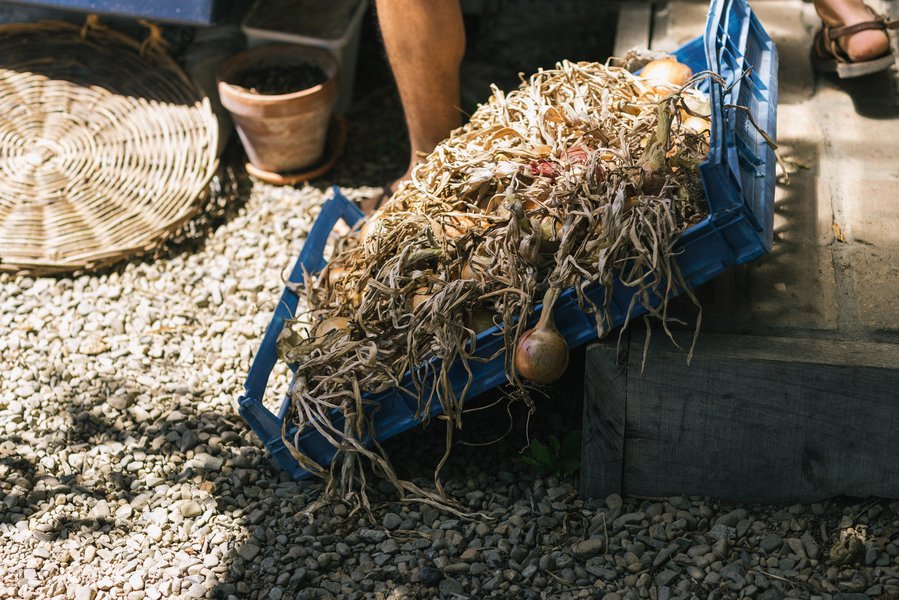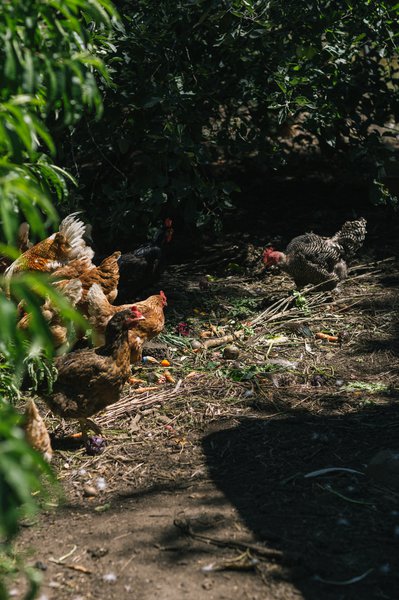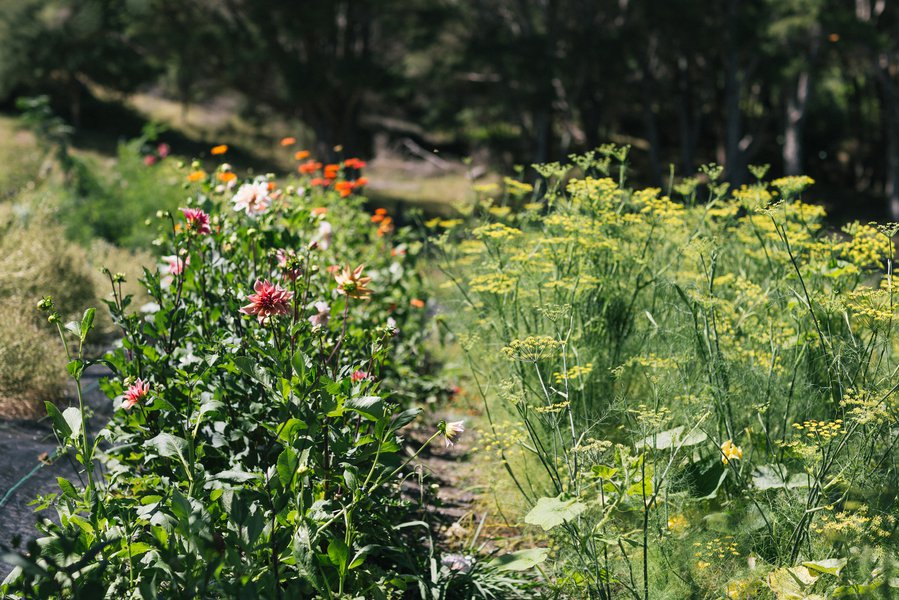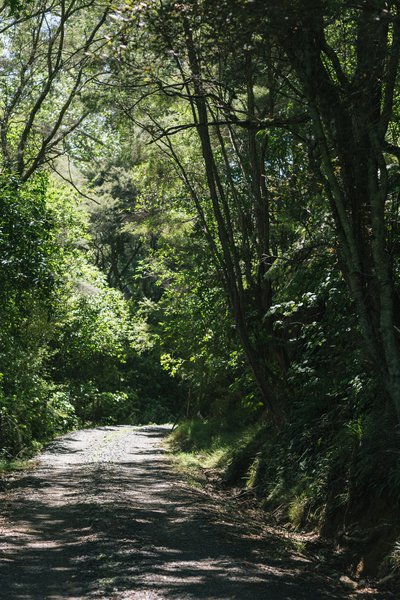Earlier this year, we drove to the Coromandel at the zenith of summer to meet with Niva and Yotam Key at their farm, Pakaraka Permaculture. I can't remember the first time I heard about the couple, probably from studying permaculture in 2018, but I have been following their work since. I always wanted to feature Niva and Yotam here. The young entrepreneurs are undoubtedly leaders of the regenerative organic agriculture movement in New Zealand; their work and forward-thinking way of living are essential to share—their farm is an organic commercial garden and an education centre for regenerative living. The parents of two also recently performed a TEDx talk, released a gardening book, and Niva is the writer and co-director of High Tide Don't Hide, the acclaimed documentary on the School Strike movement in New Zealand. What is left to accomplish?!
Something we and others think of is the pursuit of alternative ways of living. This conversation would eventually bring us to how this couple embraced regenerative organic farming and thriving outside of the city. Around a few cups of homemade oat stalk tea, the cicada's melody and the Kauaeranga Valley for the backdrop, we discussed: their youth in Israel, making a living growing organic food, life at a permaculture farm, and their views on the current food system—the issues and how to resolve them. Our exchange turned into a captivating, two-hour conversation that we are excited to share with you. We hope you will learn, get enthusiastic about regenerative agriculture, and enjoy reading as much as we did recording!
So! Who are you guys? What is your background, and what did you do before coming to New Zealand?
Niva
I am Niva, this is Yotam. We are initially from Israel, and we have been practising permaculture pretty much all our adult life.
Yotam
We come from different parts of the country. I grew up in a social justice and engaging environment. One of my grandmothers was a judge. The other established two non-governmental organisations to help in the West Bank. I learned at an early age about problems such as the occupation and the suffering of Palestinians.
At nineteen, I did my civil service in an education centre for sustainable living. I didn't know anything about the environment; I just wanted to be close to Nature. I remember coming to this farm that was off-grid and vegetarian.
This experience changed my life. I learned about how humans interacted with their environment and the major environmental problems humanity faces. I also worked with kids in schools on establishing permaculture food gardens. From the start, I felt lucky to learn about the positive things humans can do, like permaculture. There were problems, but we could resolve them by growing a garden using the appropriate technologies.
Niva
I was also raised in a social justice background and chose to do civil service. I spent a year in a kibbutz, working with special-needs people. I loved to care for the organic garden with the people living here—that is when I got my first introduction to organic gardening. Two years later, I went into Environmental Studies and Peace Leadership at University and met Yotam. I took various courses, some in environmental education, science, ecology, and sustainable agriculture.
Yotam
We both entered Environmental Studies. It is a place where Israelis, Jordanians, Palestinians and international students live together on campus, located on a kibbutz in southern Israel. We learnt Interdisciplinary environmental studies and peace leadership, understanding how we can use the environment as a tool for political change, and how to work together to protect the environment we share.
At the time, I was thinking about what career I could have as an environmentalist, lawyer, politician, economist. After many conversations, I decided that year to focus on what I was interested in, sustainable agriculture, because the food crisis was and still is so big. I wanted to create a system that demonstrated another way of living, and farming was possible. I thought, "we can help strengthen this movement". And at twenty years old, I chose to become a farmer. I kept learning, gaining experience growing food.
We just talked about it today, how it was a dream for so long to be farmers since such an early time, though we didn't know what it would be like to be farmers! What we had in mind first was to understand how much food we could grow on limited land while achieving financial viability—to create a teaching model based on a working farm. We wanted to know what we were talking about, so it took us many years to reach that stage. We continued working with a lot of people and schools, travelling across the globe to learn more.

Where did you go, and what did your travel experience teach you?
Niva
We travelled a lot in Europe.
Yotam
In Central Europe, we went to France, Spain, Italy, Croatia. You also studied for six months in Geneva, and we spent six weeks in Portugal, staying in permaculture farms and eco-villages.
We were very interested in the eco-village movement. We had taken a month-long eco-village course, which I further studied on my three-year Permaculture Diploma. We had in mind to create more than a homestead, but a life in community, with others. It is not simple to live with others as part of a community and something we need to upskill as individual people. We were born into situations where we have our tribe, small family units, but living with others outside of these spheres is something to learn. We are not used to sharing resources and making decisions with others. It's a skill.
By focusing our travels on intentional communities and Permaculture projects, we educated ourselves further on the technical details of living in a community. We did many building projects throughout our studies and spent time in gardens, but these learnings gave us the ethical and philosophical strengths to do it. We knew we wanted to live outside of Israel, so we explored where we could live, leading us to volunteer for almost a year in Costa Rica.
Niva
We volunteered in different organic permaculture farms while we were there. It was fascinating to witness. The land is entirely different, sitting in the tropics, contrasting with anything we knew. Overall, we did gardening in the desert, under a Mediterranean climate, in tempered climate, and in the tropics.
Yotam
Then we came back to Israel to study further and work. We participated in the International Permaculture Convergence (IPC) in Jordan, and we got offered a job in New Zealand.
Why did you choose to live in New Zealand?
Niva
We knew it was a good place, all together, for various reasons.
Yotam
My grandfather was born in Aotearoa, so I have an extended family here, though we never travelled here before. We had a good friend who moved to New Zealand and heard many positives. We knew we had a family's connection, so we decided to move. When you start travelling, you think you might find the perfect place, but we learned that nothing is ever perfect.
Niva
And while there are issues with the way māori are systematically discriminated against, there is Te Tiriti o Waitangi, which offers a framework for the relationships with the government. If the treaty was respected, it would lead to a more just New Zealand.
Yotam
We moved to Aotearoa in 2012, working on two organic gardens until we relocated to Pakaraka Farm in 2014. We moved to the Coromandel as we had family in the area, and we fell in love with the peninsula. It took us about three years to refine our systems and invest in the infrastructure to make a livelihood from growing organic vegetables, in a situation where it was financially sustainable. Since we reached that stage, we started teaching numerous workshops for both home gardeners and commercial gardeners.

How did you discover Pakaraka and meet Jeanette Fitzsimons and Harry Parke?
Niva
We came here originally as woofers. We were staying at a farm next door, and we heard that this place was currently available, so we came by to meet Jeanette and Harry. And we fell in love with the couple and their farm. So we decided to spend the year together, to feel if we could carry on from there.
Yotam
We were looking to start our farm. We had an excellent personal connection with Jeanette and Harry. We spent time together, got to know each other. We got along very well and decided it would be a perfect solution for all of us. We always wanted to live with other people, and for them to have a younger family that would take care of this place was positive.
What initially attracted you towards food production?
Niva
I think the appeal was to be doing something that wasn't just about the environment but also living, something where you can be hands-on. This idea took us on a big journey. And that's where we are now.
Yotam
I think living what we are preaching is essential for us. We envisioned what we wanted our life to look like; living on the land, growing food. After university, we had already decided we will homeschool our kids, so it required us to be working where we live. We also wanted to work together because we love it, so we designed our lives as a pathway to get there, and growing food was part of it. Of course, things change, and not everything comes as expected; there is the ideal and then the reality.
We also realised that, although we are doing what we can to demonstrate and create an alternative farming system, educate and help people grow more food in their gardens, the emerging problems of the environmental crisis require urgent solutions on every level. It is certainly not enough for us to grow organic vegetables for our community, change our way of life and reduce our ecological footprint. We urgently need significant, drastic climate action.
Niva
And policy change. We wanted to live what we believe in and affect our local community, but we see the emergency for policy change, international action and climate justice.
Yotam
And we take that into our growing. We try to be very specific about our inputs to the farm. We don't use amendments from everywhere to raise our soil fertility, saying things like, "Oh look, we doubled our organic matter in our soil, isn't this great?!"—we also make sure that what we put in our soil is sourced from local, sustainable resources.
Niva
When you look at permaculture, the three ethics are "Earth care, People care and Fair share". Sometimes, people don't take the third ethic into account, but it is crucial for us. Being fair and ethical is one of the things that require us to look into being better constantly.
We use our privilege to make sure we can also help people who can't afford the food we sell. We donate food. We use ethical sources; we are not relying on the exploitation of others to increase our soil fertility. Even if you try to be self-sufficient, we are all part of a system. We have to take that whole system into account.
Yotam
As permaculture farmers living in a developed country, we are connected to other problematic systems. We are still working in a capitalistic framework and a neo-liberal economy. It remains difficult to be ethical. When we do everything we can to abide by high ethical standards, it is going against the capitalist system, so it doesn't reward us.
We would like that to change. There are many advantages to having more organic, small-scale regenerative farms on so many levels—food resilience and environmental solutions, but economically it is still marginal. Even if we found a way to make it happen, we made it because we have privileges of all kinds. We could afford to live frugally for a few years to make our system work.
Niva
And again, that is why we need policy change for an ecological transition and a just transition that includes farmers who want to move into sustainable and regenerative organic farming.
Yotam
It is sad that the financial support for transitioning to small-scale organic horticulture, switching agricultural systems is slowly happening globally, yet not where it needs to be. It is unfortunate because food production is a colossal problem. The food quality now, served at cafes and restaurants, sold at supermarkets—that most people buy and eat, is low. It is mass-produced by farms using an enormous amount of chemical input, not just fertilisers contaminating fresh water and the oceans; there are also pesticides, herbicides, fungicides in astronomical volumes. People are eating food with a lot of embedded toxins. Toxins are allowed in what we consume.
One of the problems with industrial farming is that it doesn't feed the soil with the nutrients vegetables need to thrive fully. Common vegetables are not mineralised enough, which becomes a human health issue. In our first year at university, we learned about the "First World Hunger''—how we, in Western societies, are eating food that does not entirely provide us with the nutrients our body requires. By growing food on our farm through regenerative agriculture, we wanted to create a proper system that nourishes the people and one that we would be happy to eat anything that we have grown. I met so many farmers who don't eat what they produce because they know how much toxins they spread. We eat our food and grow a wide range of vegetables for our community. Those things are essential for us.
Niva
Of course, one of the main issues with chemical agriculture is that it drenches topsoil, affecting the life in the soil, all the microorganisms living there. We are in a topsoil crisis. We are losing so much topsoil because of unsustainable practices that we are losing fertility and the areas where we can effectively grow food, increasing desertification.
We must find an alternative. Even if it is currently cheaper to produce food this way, we won't keep going like this forever because it will be more challenging and expensive. From a global perspective, given the rate of population growth is increasing, the way we are treating the soil is destroying our future food growing abilities.
Yotam
At Pakaraka, we use bio-intensive methods. The organic regenerative garden we have now produces on a quarter acre the equivalent of at least an acre and a half of vegetables grown in a conventional system. That is an outstanding advantage. Although we live in this relatively large piece of land, we are gardening like we are almost in an urban area in terms of our size. The form of the landscape constrains us. This context dictates our farming, so instead of saying, "Okay at Pakaraka, we want to do a two-acre market garden, how do we change the landscape?" We worked with what was there and used what the land had to offer the best way we could.

Any notable influences that inspired your love for regenerative agriculture farming?
Yotam
The place I lived during my civil service was a great inspiration for me. That is where I became familiar with the permaculture world. Working under annual residential programs, people spend a significant amount of time immersed in a permaculture "lifestyle". In Israel, it is common to use permaculture for behavioural changes in all aspects of life, not just for gardening, landscape design or house planning. This experience was unique, including the relationships with the organisers and managers of the place.
Through our organic regenerative farm, I had in mind this interconnectedness with the community. I wanted to make sure we would reflect, offer a similar experience of homesteading and self-sufficiency, of being and learning on a farm. It is the basis and inspiration of our education centre. We also did successful internship cycles, both for the people who joined and us.
Niva
A place that inspired us was in France, La Vieille Valette in Ardèche. It is an anarchist village near a former coal mine. Fifty years after being abandoned, a group of people started to renovate the place. I remember the village was beautiful. A stone sculptor was living there, so they renovated all the ancient houses with beautiful artistic expressions.
It is a place where people can come, do or not do, and they manage the entire village through this philosophy. They created living spaces, re-started the bakery, and also had bees. When we were there, they were harvesting these massive potato fields with horses. I think the coolest thing in La Vieille Valette is that people could create all of that as a collective without following a frame. It is beautiful.
Yotam
It was fascinating to see something different. As we said, we still have to work within a capitalist framework, so it is not just about a new way of farming—we also need a new way of life, in our households, our communities, in our municipal ways.
Niva
And it is hard. We work a lot, but it is good to remember you can also not do that, still thrive, and still create beautiful things and take care of each other.
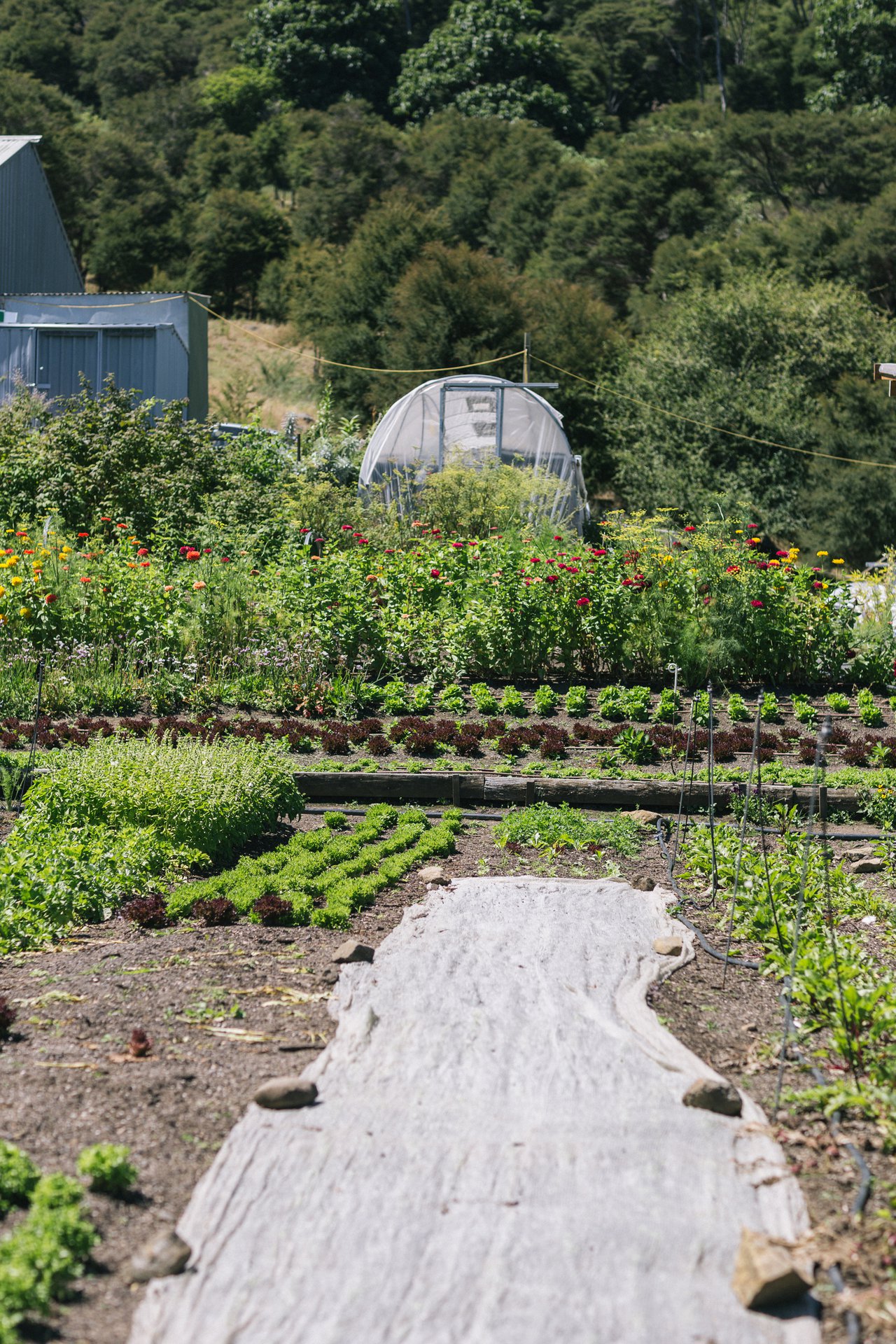
When did you realise there was an opportunity to turn your passion into a business, and which difficulties did you encounter?
Yotam
We never thought about it as a business! Producing food was simply our dream. It felt right.
Niva
We just went ahead full steam, taking our growing and management experience.
Yotam
Last week, we were advising someone who wants to start his regenerative farm. He came to us because he wanted to get going, so now he volunteers at the farm once a week, beginning a few months ago. I was suggesting to him that he also needs to learn basic small business skills in addition to upskilling in gardening.
We didn't know that when we started, and it was a big learning curve. We didn't know enough about marketing, accounting, cash flow, all these types of things, even pricing. In our first year, we were charging well below what we needed. Accounting was a big one. I was already in a management position before; I knew how to manage the day to day operation, but here, we were making something different and we had to improve our systems all the time. We still need to acquire knowledge about every aspect.
And that also counts for our permaculture growing system: how to grow organic vegetables in an efficient and profitable way. In terms of regenerative gardening methods, we realised that some strategies we had in mind didn't make much sense. We had to refine how to grow vegetables in high intensity and high yield while improving our soil health. Gaining knowledge in food production techniques was significant. It's not just a home garden. For example, when growing cucumbers. The trick is to grow consistent amounts of the same produce over a long season, rather than everything in one go. We try to have cucumbers from the middle of October to the middle of May. This way, we sell over 2,000 kg of fresh Lebanese cucumbers over the season.
We also work with the people staying with us, having their input, always involving them for feedback to improve our systems and processes. Two weeks ago, we made a hole in the barn wall so we can have better access between the shed and the cool room. It improved our working flow a lot. We do things like this all the time, constantly refining. In the beginning, we wanted to do everything at once, but it wasn't possible. As the Permaculture principle goes, we take slow and small steps, and plan our farm and our business to our constantly adapting needs.

This interview has been edited and condensed for clarity.
Everything we create is an effort to participate in a culture shift. All products featured are independently selected and curated by the authors, and we only feature items we use or would use ourselves that align with our values. As part of our business model, we do work with affiliates such as Amazon. As an Amazon Associate, we earn from qualifying purchases if you decide to purchase through our links. The price would be the same to you either way, but if you find value in our work, then these affiliate links are a way to support it. We only recommend brands, makers and products we use — that we support. Transparency is important to us, so if you have any questions, please reach out to us.


